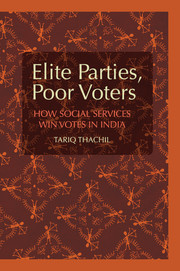
- Publisher:
- Cambridge University Press
- Online publication date:
- November 2014
- Print publication year:
- 2014
- Online ISBN:
- 9781107707184

Why do poor people often vote against their material interests? This puzzle has been famously studied within wealthy Western democracies, yet the fact that the poor voter paradox also routinely manifests within poor countries has remained unexplored. This book studies how this paradox emerged in India, the world's largest democracy. Tariq Thachil shows how arguments from studies of wealthy democracies (such as moral values voting) and the global south (such as patronage or ethnic appeals) cannot explain why poor voters in poor countries support parties that represent elite policy interests. He instead draws on extensive survey data and fieldwork to document a novel strategy through which elite parties can recruit the poor, while retaining the rich. He shows how these parties can win over disadvantaged voters by privately providing them with basic social services via grassroots affiliates. Such outsourcing permits the party itself to continue to represent the policy interests of their privileged base.
Winner, 2015 Luebbert Book Award, Comparative Politics Section, American Political Science Association
Winner, 2015 Leon Epstein Outstanding Book Award, Political Organizations and Parties Section, American Political Science Association
Winner, 2015 Gaddis Smith International Book Prize, MacMillan Center for International and Area Studies, Yale University
‘Why would poor people support elite parties that do not advance their interests? In a fascinating and rigorous analysis, Tariq Thachil demonstrates that the private provision of services serves both the interests of poor supporters and the elite core. This incisive and compelling book addresses critical questions in comparative politics about the nature and uses of political parties, their supporters, and patronage.'
Anna Grzymala-Busse - University of Michigan
‘This is a truly superb, important, and beautifully written book. Thachil uses the fascinating case of India's BJP to explore how elite parties try to recruit and mobilize poor voters. Besides shedding highly original empirical light on the most populous poor electorate on earth, Thachil offers a major contribution to a wide array of theoretical literatures, ranging from clientelism to religion to party organizations. Elite Parties, Poor Voters will deservedly attract a major audience in South Asian and comparative politics circles alike.'
Dan Slater - University of Chicago
‘The triumph of the Hindu nationalist BJP party in India's most recent general election was no surprise. Rather, as Tariq Thachil shows here, its victory was rooted in a painstakingly built record of service provision by its social wings. Thachil's sophisticated theorizing is ably undergirded by rigorous multifaceted evidence. In a world of neoliberal economic policy prescriptions that leave poorer citizens of developing countries few alternatives to services provided by extremist groups in their societies, Elite Parties, Poor Voters deserves serious attention from anyone interested in political parties, elections, or India.'
Irfan Nooruddin - Edmund A. Walsh School of Foreign Service, Georgetown University, Washington DC
‘This book adds important new dimensions to discussions of why and how the BJP, an upper-caste Hindu nationalist political party in India, gains support from non-elite voters outside of its core support base. Thachil’s focus on the BJP’s ‘patient’ methods of persuasion presents a convincing argument about the conditions under which service provision pays off in attracting votes. His position is well-supported by a formidable combination of different types of quantitative data supplemented by qualitative research. Thachil’s insightful characterization of the broader implications of his argument brings new perspectives and depth to studies of vote-buying and electoral politics in the non-Western world.’
Melani Cammett - Brown University, Rhode Island
'Why poor people support political parties that represent the economic interests of the wealthier communities is a puzzle amply discussed in the literature on the developing world. But it remains a black box in the developing world. Combining ethnography, large-n statistical work, and good old 'soaking and poking', as Richard Fenno put it, Thachil enters that black box … It is noteworthy that as Elite Parties, Poor Voters was about to be published, something eerily confirming its basic arguments happened. In India’s 2014 national elections, the [historically upper caste] BJP polled more votes than the Congress Party among three of the biggest subaltern categories … which was unprecedented. Thachil had already worked for years on how this denouement might have come about. He was able to identify the deeper forces and strategies at work.'
Ashutosh Varshney Source: Perspectives on Politics
'Why do poor people often support political parties that do not champion their material interests? The excellent response that Tariq Thachil offers, based on mixed methods, is very sophisticated and nuanced. After dismissing the commonplace interpretations that do not work fully - including clientelism and the instrumentalization of religion - Thachil presents his own thesis and argues the expansion of private welfare played a key role in explaining the unlikely success of an elite party within the world’s biggest democracy … Thachil’s remarkable book is the first attempt to analyze in detail how the BJP can derive some electoral dividends from social work.'
Christophe Jaffrelot Source: Journal of Asian Studies
'Elite Parties, Poor Voters masterfully walks a number of proverbial tightropes at once. It offers a parsimonious theoretical argument without sacrificing nuance; it is grounded in qualitative fieldwork, while making use of sophisticated quantitative methods; and it represents a timely, much-needed treatment of Indian politics that speaks to the wider comparative politics literature and travels beyond India … Elite Parties, Poor Voters represents the best of what comparative politics has to offer.'
Adam Ziegfeld Source: The Journal of Politics
'Elite Parties, Poor Voters is a major contribution to our understanding of how India’s parties court the poor, and will be an invaluable resource for researchers examining thesequestions comparatively.'
Rob Jenkins Source: Pacific Affairs
 Loading metrics...
Loading metrics...
* Views captured on Cambridge Core between #date#. This data will be updated every 24 hours.
Usage data cannot currently be displayed.